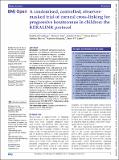A randomised, controlled, observer-masked trial of corneal cross-linking for progressive keratoconus in children : the KERALINK protocol
Abstract
Introduction: The KERALINK trial tests the hypothesis that corneal cross-linking (CXL) treatment reduces the progression of keratoconus in comparison to standard care in patients under 17 years old. KERALINK is a randomised controlled, observer-masked, multicentre trial in progressive keratoconus comparing epithelium-off CXL with standard care, including spectacles or contact lenses as necessary for best-corrected acuity. Methods and analysis: A total of 30 participants will be randomised per group. Eligible participants aged 10-16 years with progressive keratoconus in one or both eyes will be recruited. Following randomisation, participants will be followed up 3-monthly for 18 months. The effect on progression will be determined by K-2 on corneal topography. The primary outcome measure is between-group difference in K-2 at 18 months adjusted for K-2 at baseline examination. Secondary outcomes are the effect of CXL on (1) keratoconus progression, (2) time to keratoconus progression, (3) visual acuity, (4) refraction, (5) apical corneal thickness and (6) adverse events. Patient-reported effects will be explored by questionnaires. Ethics and dissemination Research Ethics Committee Approval was obtained on 30 June 2016 (ref: 14/LO/1937). Current protocol: V.5.0 (08/11/2017). Study findings will be published in peer-reviewed journals.
Citation
Chowdhury , K , Dore , C , Burr , J M , Bunce , C , Raynor , M , Edwards , M & Larkin , D F P 2019 , ' A randomised, controlled, observer-masked trial of corneal cross-linking for progressive keratoconus in children : the KERALINK protocol ' , BMJ Open , vol. 9 , no. 9 , e028761 . https://doi.org/10.1136/bmjopen-2018-028761
Publication
BMJ Open
Status
Peer reviewed
ISSN
2044-6055Type
Journal article
Description
This work was supported by the Efficacy and Mechanism Evaluation Programme (reference 14/23/18), a MRC and NIHR partnership.Collections
Items in the St Andrews Research Repository are protected by copyright, with all rights reserved, unless otherwise indicated.

